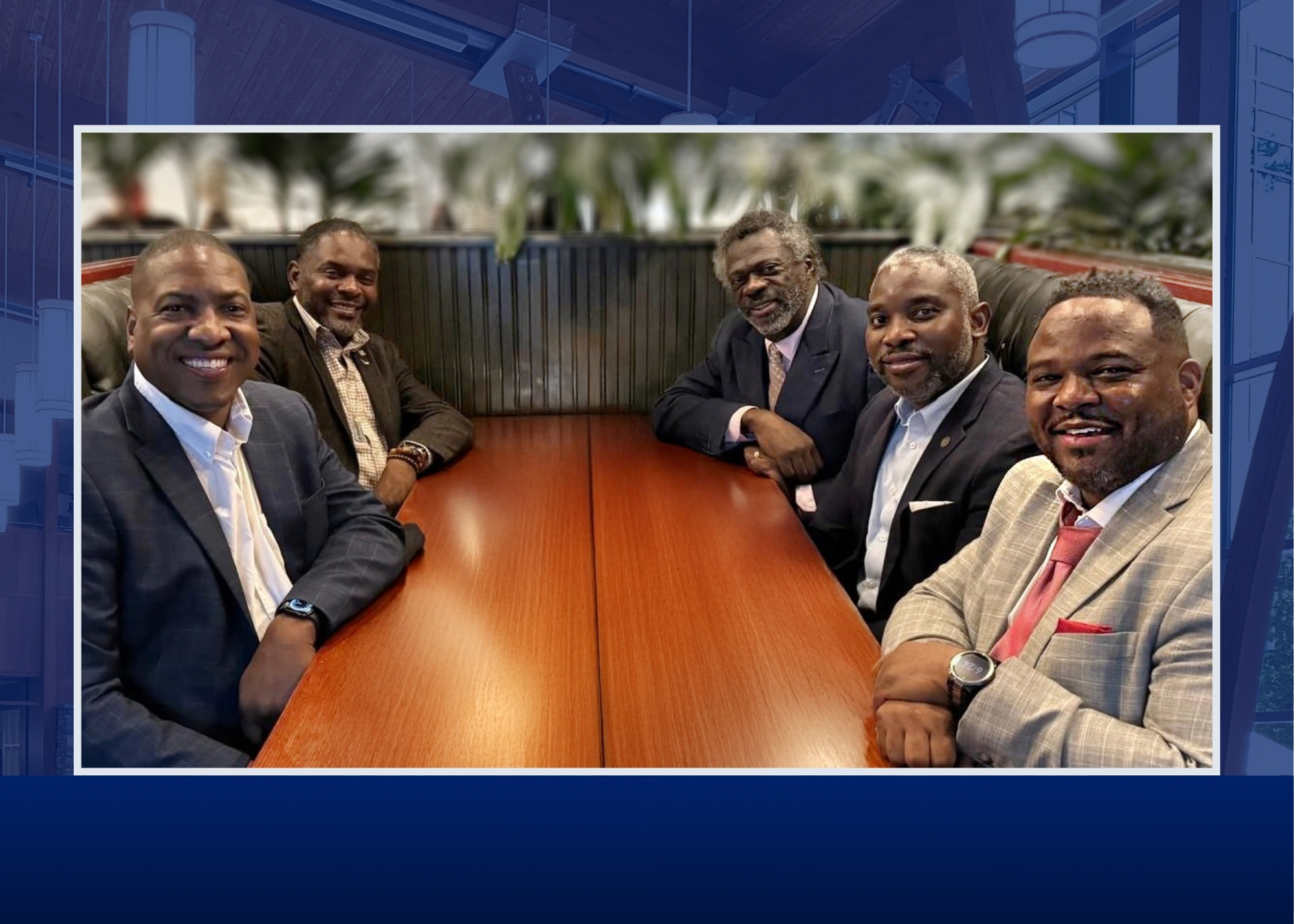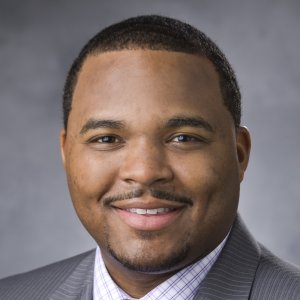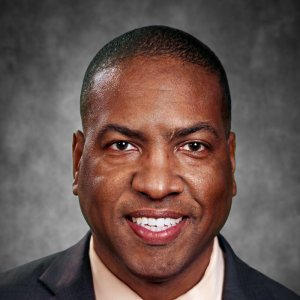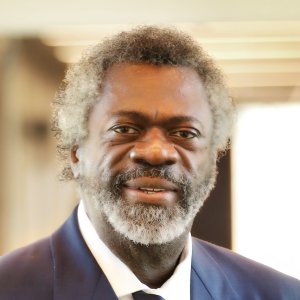Black Men in Nursing: Overcoming Barriers and Leading Change
Three faculty members contribute to an oral history to emphasize the importance of mentorship, community support, and resilience as Black men in nursing.

The underrepresentation of Black men in nursing continues to pose a significant challenge to diversity and equity in healthcare leadership. Systemic barriers such as implicit bias, limited access to advanced education, and lack of mentorship have been well-documented, but there is little literature highlighting the specific journeys of Black male nurse leaders and the strategies that facilitated their success.
“Aspiring [Black male] nurses need to hear these experiences to realize that it can be done, and they can do it too.”
“My journey began as a medic in the Army,” said Assistant Director of the School’s DNP Nurse Anesthesia Program Dr. Derrick Glymph. “Then I became an LPN and progressed through several steps to become an advanced practice nurse, CRNA, and eventually a clinical doctorate and PhD-prepared nurse … Aspiring [Black male] nurses need to hear these experiences to realize that it can be done, and they can do it too.”
Glymph and two other Duke University School of Nursing faculty, Vice Dean for Diversity Equity, Inclusion, and Belonging Dr. Ernest Grant and Associate Professor Dr. Michael P. Cary, recently contributed to an oral history documenting their personal nursing journeys.
“I think sharing my experiences will let others (especially young Black men) know that other people have been in their shoes,” Grant said. “It gives them the opportunity to seek out someone that has experienced various things and have dialogue about what to do and how to do things.”
"By sharing my story, I hope to inspire confidence, foster resilience, and celebrate the unique contributions Black men bring to nursing.”
Despite recommendations to increase diversity of representation in nursing, there has been limited progress in terms of racial, ethnic, or gender diversity in the nursing profession. There are disparities in representation among racial and ethnic minority groups in academic leadership and research positions, with Black male nurses being particularly underrepresented. The National Nursing Workforce Survey reported that the majority of registered nurses are female (80%) and White/Caucasian (80%), with only 6.3% being Black/African American.
“Sharing my experience as a Black man in the nursing profession helps aspiring nurses by showing them what is possible,” Cary said. “By sharing my story, I hope to inspire confidence, foster resilience, and celebrate the unique contributions Black men bring to nursing. It’s about showing that the challenges can be overcome and that our presence not only matters but is vital to creating a more inclusive and compassionate healthcare system.”
Here are some excerpts from each of their stories:
Michael P. Cary, PhD, RN, FAAN
Throughout my career, I felt the sting of racism and discrimination. Before I began my PhD program, during my interview, I was bluntly told, “I can’t see you being successful here,” reflecting biases rather than my qualifications. Another encounter, during my first year as a faculty member at Duke (with an individual no longer at Duke), who disparagingly questioned my ideas by saying, “Where do you come off thinking you have good ideas? It’s embarrassing for you to question my decisions.” These experiences were not only personally hurtful but also highlighted the pervasive racial biases that Black professionals often face.
Derrick Glymph, PhD, DNAP, CRNA, CHSE, CNE, COL., USAR, FAANA, FAAN
Now, in my third decade in nursing and as a Colonel in the Army Reserves, I have progressed from earning a diploma to obtaining multiple degrees: LPN, ADN, BSN, MSNA, DNAP, and PhD. Throughout my career, I have worked in diverse settings, including nursing homes, med–surg floors, surgical floors, surgical step-down units, ICU, and operating rooms. I even served as the sole anesthesia provider in a war zone in Afghanistan. Often, I faced isolation as the only Black male nurse, lacking Black male role models. Many of my mentors were Black women who took me under their wings, helping to guide me into various leadership roles and positions. One of my biggest supporters was a White male who advocated for me in key academic settings. Recently, a colleague who didn’t know me remarked that I had too many credentials. I could not help but wonder if they would say the same to someone who wasn’t a person of color. In the words of my grandmother, “There is plenty of room at the top.”
Ernest Grant, PhD, RN, FAAN
I started in the LPN Program in the fall of 1976. I was one of two males in a class of 45, but the only Black male. Three months into the nursing program, I totally forgot about medical school as I realized that nursing was my calling! I wanted to do everything I could to advocate for my patients and my community. After graduation, I began my nursing career working on a medical–surgical floor that also took orthopedic overflow. Standing at 6′6″, and being very dark skin, meant this was the beginning of my encounter with racism, sexism, and stereotypes that was instantly applied to Black men who dared to enter a female-dominated profession. I encountered comments such as… “is there anyone else?” when I would introduce myself as being their nurse for the day, or “when will you finish medical school” or being referred to as an orderly. I quickly realized that I needed to develop a thick skin and stand up for myself or I would feed into those stereotypes.
"Often, Black men do not seek guidance, but it is vital to have a network to guide them in considering the various career directions in nursing."
The personal stories of these nurse leaders aim to contribute to the ongoing discourse on representation in nursing leadership and provide inspiration to future generations of minority nurses.
“Often, Black men do not seek guidance, but it is vital to have a network to guide them in considering the various career directions in nursing,” Glymph explained. “I encourage them to believe they can do it. They may feel like the only one at times, but they are not alone.”
The oral history underscores the need for data collection and reporting on demographic data in nursing to understand disparities, allocate resources, and create policies that address the needs of minoritized groups such as Black men. By reflecting on their unique experiences, Drs. Grant, Cary, and Glymph offer strategies for improving health equity and fostering a more inclusive nursing profession.
“To any Black man considering a career in nursing, I would say: believe in your ability to make a difference,” Cary insisted. “Nursing is a rewarding and transformative profession where you can truly make a difference in the lives of individuals and communities. Seek out mentors who uplift you and guide you, and connect with networks like the Network of Black Male Nurse Leaders to build community and find encouragement. Most importantly, embrace this journey, knowing you have the power to lead, innovate, and inspire others along the way.”
Cary, Glymph and Grant co-founded the Network of Male Black Nurse Leaders alongside colleagues Dr. Bim Akintade, Dean of East Carolina University (ECU) College of Nursing and Dr. Michael L. Jones, Clinical Associate Professor and Inaugural Associate Dean for Culture, Engagement, and Professional Development, also at ECU College of Nursing.
Read more in the journal Nursing Outlook, here.
Cary, Glymph, and Grant will be sharing their stories on February 11 as part of a special webinar with the National League of Nursing. Learn more and register here.


